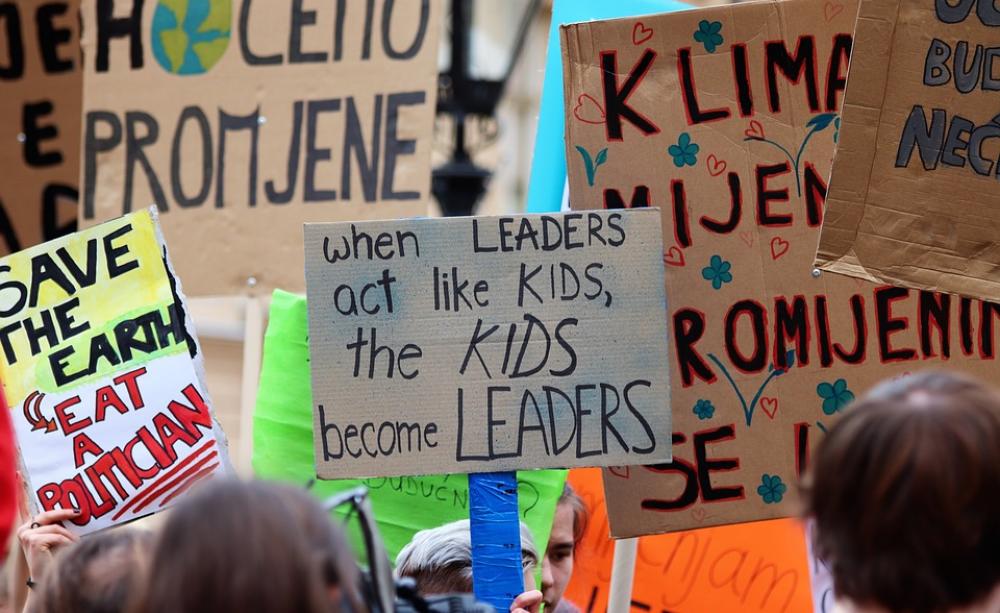In the run-up to last year’s United Nations Climate Conference in Lima, Peru, a particular headline kept popping up, an attempt to once again establish a particular meme in the mind of global elites as well as wider populations: friends, the line goes, you’re right to worry about climate change, but – say the reports by, on the one hand, the International Monetary Fund, and on the other, the New Climate Economy Project (in essence a second Stern Report) – what you really, really shouldn’t do, is start believing that worrying about climate change should make you worry about trying to end economic growth’. Economic growth, so the story goes once again, can in fact be made to work very nicely with climate protection, if only it’s done the right way.
Whereas Naomi Klein reminds us forcefully in her new excellent book that climate change, literally “Changes Everything”, folks like the almost irrepressibly optimistic Paul Krugman actually manage to lump the climate-denialist Koch Brothers together with those parts of the climate movement that, basing themselves in sound evidence and strong theoretical argument, point to the fact that reducing greenhouse gas emissions to safe levels requires structural changes to the world economy, rather than just a bit of carbon pricing.
The battle, it seems, has been joined: in the run-up to the twenty-first climate summit in Paris the world is once again debating the question of how to drastically reduce emissions, and once again the prophets of ‘decoupling’ – i.e. decoupling economic growth from environmental destruction – are banging their drums. Which raises the question of whom, or what, they are trying to drown out? Well, you see, alongside the stop-and-go-debate about climate change, there’s a discussion that’s been developing in the shadows of the global media landscape, particularly in the global North, Europe and Canada, to be precise: a discussion about how insane it is to have, on a finite planet, an economic system that is premised on infinite growth. And about what an alternative to this might be, a still fairly vague conception alternatively (and with slightly differing emphases) referred to as degrowth, post-growth or décroissance.
Now, it appears from the force of the push to convince us – against most available evidence, to be sure – that economic growth and climate protection are compatible, that the hope in the liberal mainstream is to avoid this critical debate on degrowth, which may in fact constitute a movement, joining forces with the climate justice movement to push even more forcefully for the structural changes we know to be necessary. The concern is understandable. After all, both ‘movements’ have in common a tendency to be strongly critical of capitalism, and to focus at least parts of their critique on capitalism’s twin tendencies of overproduction and overconsumption1, and an alliance between them would be eminently desirable.
This, then, was one of the many important questions that were raised at last year’s Degrowth Conference in Leipzig. What, the organizers had asked, might the relationship be between the degrowth-‘movement’ and other social movements, in particular the climate justice movement. Precisely because an alliance between these two movements would be so desirable, I thought it useful to start on something of a note of discord: there are in fact significant differences between the two, and without first recognising these, it will be all the harder to overcome them. Kind of the way it is in any good relationship. So before we jump straight into bed, let’s talk about our differences, ok? As I see it, there are three crucial differences that we need to be aware of.
The first difference is that while degrowth is a story that is largely articulated in the global North, a story that speaks from and to sensibilities that exist largely in the North, climate justice is a movement and a story that it articulated and led by folks in the global South. When Niko Paech, a well-known German degrowth-theorist and (in the best sense of the term) propagandist, suggests that one of the issues facing us is the need to “protect oneself against a veritable deluge of consumption opportunities”, he is clearly pointing to a problem that does not affect the majority of the world’s population, but rather one that is largely experienced in the global North, and even there it is an issue that properly belongs in a middle-class discourse. In turn, climate justice as story and movement is based on the experiences of the broader environmental justice movement(s) that arose in the US in the 1980s among communities of colour – i.e. the South in the North – in general, and indigenous communities in particular.
The argument then was that environmentalism was largely a movement of white, middle-class people, for white, middle-class people. Their entirely understandable demands not to have their communities’ air polluted and children poisoned by dirty chemical and power plants had an unfortunate effect: rather than these plants actually being shut down and dismantled permanently, they were in effect simply moved – away from wealthier white communities, into poorer communities of colour. Thus, by not looking at seemingly environmental problems also as social problems, by not being aware of the way a particular dirty factory is embedded in broader social structures of domination and exploitation, liberal environmentalism didn’t solve the problems it arose to tackle, but merely displaced them a few steps down the ladder of social power.
Whether intentional or not, this ‘NIMBYism’ (Not In My Back Yard) amounted not to environmentalism, since ecological problems weren’t actually being solved, but in fact to a new form of environmental racism – against which the new movements referred to themselves as movements for environmental justice. In the mid-1990s, as the Kyoto-Protocol with its various ‘market-based mechanisms’ was being formulated – mechanisms that, as we know today, do little to solve the climate crisis, but continue to displace indigenous peoples from the ancestral lands they have occupied for so long – this story was once again taken up, and against what might be called the ‘climate racism’ of carbon offsets and other measures, a US-indigenous leader, Tom Goldtooth2, first articulated the call for climate justice, around which, since then, a diverse and inspiring global movement has sprung up.
The reason to go into this history, and the different points from which the stories are articulated, is not to bash ‘degrowthers’ over the head, tell them to ‘check their privilege’ and shut up about things, but rather to point to the dangers inherent in the degrowth-story, namely the danger of a new global environmental racism along the lines of: ‘hey, you lot in the global South, stop growing!’, or indeed an environmental classism: ‘hey, you poor lot in the North, we all need to tighten our belts’, and we all know who usually ends up tightening their belts in such a situation.
Because of this danger – and just to be clear again, I am not accusing the degrowth-movement of environmental racism, I am pointing to it as a danger that arises precisely if and when the degrowth-debate becomes more widespread and gains media space – it is incumbent upon degrowth to take the global justice dimension into account more than this has so far been the case. At the same time it was precisely that very idea of global environmental justice, that, combined with the notion of limited natural resources, motivated many degrowth thinkers and activists to question structural patterns of overproduction and overconsumption in the first place. With this in mind, the degrowth movement is not simply another paternalistic concept from the North trying to impose a certain development path on the South; it rather opens up opportunities and alliances for diverse and bottom-up change across the world.
This interaction with different perspectives, however, requires the degrowth-movement to leave behind its two favourite aggregate states, that of scientific debate on the one hand, and marginal niche-project on the other, and to think in strategic terms, in terms of struggles, demands and opponents, and in terms of global efficacy. Would a demand like ‘leave it in the ground’ (where ‘it’ is fossil fuels and other finite resources) not resonate well with a degrowth-movement? But more on that later…
The second difference is that, while climate justice is rooted in specific struggles – those of frontline communities and their allies fighting against resource extraction, industrial agriculture, megaprojects and the effects of climate change – and therefore also identifies agents of change, even if those agents sometimes appear insufficiently powerful to achieve their desired outcomes, degrowth seems to precisely not be rooted in specific struggles, but rather starts from a conceptual critique, from an idea. From a movement perspective, this lack of a base is problematic, insofar as it means that the degrowth movement cannot (yet?) answer the question I consider to be central to any social movement: who would fight for your goals (in this case degrowth) and why? Do these agents have the interest and the capacity to change the existing state of affairs? Because it lacks a social base and isn’t rooted in struggles, because it is rooted more in a widespread sense of cultural unease (with Freud, an ‘Unbehagen in der Kultur’, a sense of unease that pervades an entire culture) the degrowth-movement necessarily has a hard time identifying fields of collective transformative practice for those whom it politicises.
But there is also a third difference, one that is probably in some ways a result of the first two outlined above: degrowth is a story that strongly resonates in parts of Europe and the global North, whereas our efforts, at least in Germany, to establish a climate justice movement have fallen pretty flat. Exhibit a: the very fact that the Fourth Degrowth Conference managed to gather some 3.000 people in the Eastern German city of Leipzig, whereas no social movement that I’m aware of here could pull off much more than 2.000 people even if they met in the much more easily accessible capital – let’s just say that a conference on climate justice would struggle to draw even 1.000 participants. To be sure, this success was in no small part due to the organisers’ truly amazing efforts, but was at the same time indicative of the fact that the story of degrowth resonates far beyond the circle of usual suspects at movement events (this was also highlighted by the fact that many participants had never been to a social movement conference).
Exhibit b: from 2011 to 2013 there was a major (if politically somewhat ineffectual) parliamentary inquiry into questions of growth, well-being and quality of life, showing that the critique of growth ‘infects’ even conservative and liberal cultural milieus. And finally, exhibit c comes from my own experience: if I try to convince my conservative grandfather of the climate justice-story, of the fact that the wealth accumulated in the global North in fact constitutes a massive debt we owe the global South, he usually ignores me; if I point out to him what is probably the absolutely central point in the degrowth-argument, namely that ‘there cannot be infinite growth on a finite planet’, he is forced to agree and based on that we can actually start a conversation that is critical of capitalism. And in this story, my grandfather is simply a stand-in for many people in the global North, who have little truck with ‘climate justice’, but who share the sense of unease that the degrowth movement has managed to articulate.
So here’s the point I’m trying to make: yes, there are significant differences between the degrowth movement and the movement for climate justice – but in a way, they are actually complementary differences. What degrowth lacks (a base in struggles, and an effective conception of global justice), climate justice can bring to the relationship, and what climate justice lacks (a frame that resonates in the North), degrowth can bring. And beyond this strategic point, there remains the fact that scares Krugman and others so much, that the two movements are necessarily related because degrowth in the North is a necessary (albeit insufficient) condition for global climate justice, seeing as that economic growth is so closely tied to greenhouse gas emissions, and that Southern countries retain what is frequently referred to as a ‘right to development’.
But new movements, or coalitions between movements, are not built simply on having the right arguments, they arise out of struggles that are fought in common. So on the one hand, there is a movement – the global climate justice movement – that after the obvious, repeated, impossible-to-ignore collapse of the UN climate negotiations as well as of civil society strategies that focus on these negotiations, is still looking for common points of convergence: points of attack, in other words. And on the other, there is a potential movement – degrowth – that is casting around for fields of collective practice and action that would allow it to challenge the madness of eternal capitalist growth in ways that are more effective than the frequently rather marginal, often individual practices of transformation that currently make up much of the field of degrowth. What struggle might they have in common?
One possible answer is really quite straightforward: the struggle against fossil fuels, against fossil fuel extraction, against fossil fuel finance, against fossil fuel corporations. Why? First of all, it is no secret that fossil fuels are the core fuel of the engine of eternal capitalist growth, such that we are living in what German Marxist Elmar Altvater referred to as ‘fossilistic capitalism’. To be sure, we can imagine a capitalism based on renewable energies, but really existing capitalism has, for the last 200, 250 years been driven by fossil fuels. And at the same time, the contribution of land-use changes to climate change notwithstanding, the burning of fossil fuels is also the key cause of human-driven climate chaos. And the degrowth perspective is as essential for climate-justice as the struggle against fossil fuels itself, as it adds an often ignored point to the debate: That renewables alone cannot power the globalised growth-economy. Combined with political action against fossil fuels, this claim raises the question of equal distribution of limited resources with increased urgency – and might even help the anti-lignite struggle in Germany and other European countries pick up speed.
So whereas it seemed to me during the conference that the degrowth-movement was more or less ‘speed-dating’ other movements (kind of proving the point that the degrowthers were trying to open up new fields of collective practice for themselves, there were plenty of workshops along the lines of ‘degrowth and X’, where X might be feminism, climate justice, care movements, etc.), Christopher Laumanns, one of the organisers, suggested on the closing plenary of the event that, rather than speed-dating each other, degrowth and climate justice are actually married to each other. So if that’s the case, let’s put rings on each others’ fingers, and let’s go fight those fossil fuel corporations: we couldn’t do much better to further our respective, and our common, agendas. And it would make for an excellent honeymoon trip… ------------------------------ 1 That is to say, overconsumption from an ecological perspective. From a politico-economic perspective, neoliberal accumulation is in fact plagued by underconsumption due to nearly 35 years of real wage stagnation or even losses. 2 Source: personal communication with Tom Goldtooth. -------------------------------
The initial version of this article was published by the Eco-Instigator in October 2014
The Well Planet Manifesto is an invitation to undertake an agenda of research that is closer to the state of emergency in which we find ourselves. It encourages researchers, activists, policy-makers and member of civil society to act according to this emergency. Those are invited to connect to one another by signing up the manifesto, in order to establish a research network. See the manife...

School climate strikers in Edinburgh demanded unity and action. My decision to attend and support the Edinburgh School Strike, like my arrival, was late. As I left Waverley Station I listened intently for the sound of protest but the city gave up only its regular sounds; the beat and grind of petrol and diesel engines busy pumping out their invisible death, the whoosh of air b...

Against the background of a looming ecological collapse and extreme socio-economic inequality, growth-critical scholars and activists debate various eco-social policies that can facilitate transitions towards genuinely environmentally sustainable and socially equitable societies. Such policies include work sharing, time-banks, job guarantees, complementary currencies and minimum income schemes....